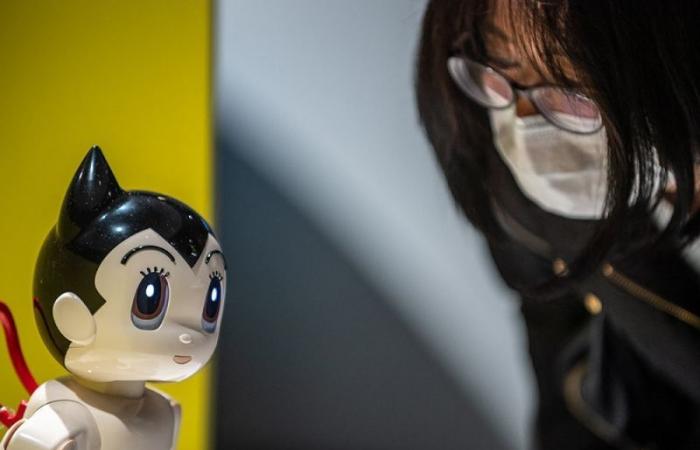Mangas, TV series, novels… faced with the unprecedented success of foreign adaptations of Japanese works, long criticized for their lack of fidelity, Japanese creators are organizing themselves to respond to the growing demand from Western producers, fueled by successes like the one in the Shogun series.
Last year, the adaptation of the juggernaut One Piece, a manga with more than 500 million copies sold, with a Mexican actor in the main role, was praised by spectators and critics alike.
Other adaptations of major manga into films and series are in preparation, such as the adventures of the ninja Naruto or the adventures of the superheroes of My Hero Academia.
France is not left out: the television series inspired by the manga Les Gouttes de Dieu on oenology was crowned best drama series at the International Emmy Awards at the end of November, and a rereading of the work Cat’s Eyes by Tsukasa Hojo, mangaka at the origin of City Hunter, was broadcast at the end of November on the TF1 channel.
“Demand from Western markets is clearly increasing” for Japanese works, popularized in particular thanks to streaming platforms, explains Kaori Ikeda, director of Tiffcom, the audiovisual content market organized on the sidelines of the Tokyo International Film Festival.
To help supply meet this demand, and aware that “Japan still lacks know-how” in negotiating rights, Tiffcom set up the “Story Market” system last year, in which this company participated. year six Japanese publishing houses.
Very vigilant fans
Many foreign producers have failed on adaptations in the past, such as the Hollywood version with Scarlett Johansson of Ghost in the Shell (2017), accused of “whitewashing”, the practice of choosing white actors to play characters. in this case Japanese.
Death Note, a screen transposition of the famous eponymous manga, was also panned, deemed too far from the original material.
“Manga authors are very respected and fan communities are very vigilant,” underlines Klaus Zimmermann, producer of the television series adapted from the manga Drops of God.
This Franco-Japanese adaptation allows itself some liberties, in particular by introducing a French protagonist. But it was developed in close collaboration with the authors of the original work, explains the producer. “It was about finding the spirit of the manga so as not to distort it. »
“At each stage of production, there was great understanding” on the part of all stakeholders, greets Yuki Takamatsu, responsible for negotiating rights at the publisher of this manga, the Japanese giant Kodansha.
For him, past failures are partly explained by publishers’ difficulties in explaining their wishes to foreign producers, but also by a less good knowledge of manga and anime than today.
“15 or 20 years ago, the big studios were like, ‘Hey, I know Dragon Ball, do you have the rights?’ “. They were only interested in this mega content. »
“But today, especially since Covid, producers watch anime with their children” and “are looking for increasingly diverse content. »
“Video Gag”
Japanese television channels are also benefiting from this demand.
Long focused on the domestic market, these have become “much better at selling their content” particularly during global events like Mipcom in Cannes, thinks Makito Sugiyama, a manager of the Japanese Association for the Export of Television Programs (BEAJ).
If Japanese broadcasters have long been used to selling their show concepts, such as the one – exported to more than 100 countries – known in France as Video Gag, certain Japanese series now also find a wide response abroad .
Mother, an original fiction from the Nippon TV channel which evokes parenthood and abuse, has been adapted or broadcast in around fifty countries including France.
For Masaru Akiyama of the BEAJ, Western spectators have also overcome their initial reluctance to watch series with Asian actors: “They have gotten used to it, they don’t care anymore. What interests them are stories. »
The historical series Shogun, which triumphed in September at the Emmy Awards by winning 18 awards, also “changed the game” for Japan by attracting worldwide attention, believes Mr. Akiyama.
This fresco of 17th century Japan, adapted from a novel by the writer James Clavell but produced with a Japanese cast, producers and authors, is “a very strong stimulation for Japanese creators who saw such success was possible,” underlines Ken Muratsu, one of the managers at Tiffcom.
For Kaori Ikeda, “that a samurai story with such attention to historical detail can become mainstream entertainment is proof of the potential” of Japanese works.
Mathias CENA/AFP
Mangas, TV series, novels… faced with the unprecedented success of foreign adaptations of Japanese works, long criticized for their lack of fidelity, Japanese creators are organizing themselves to respond to the growing demand from Western producers, fueled by successes like that of the Shogun series. Last year, the adaptation of the juggernaut One Piece,…
- -





